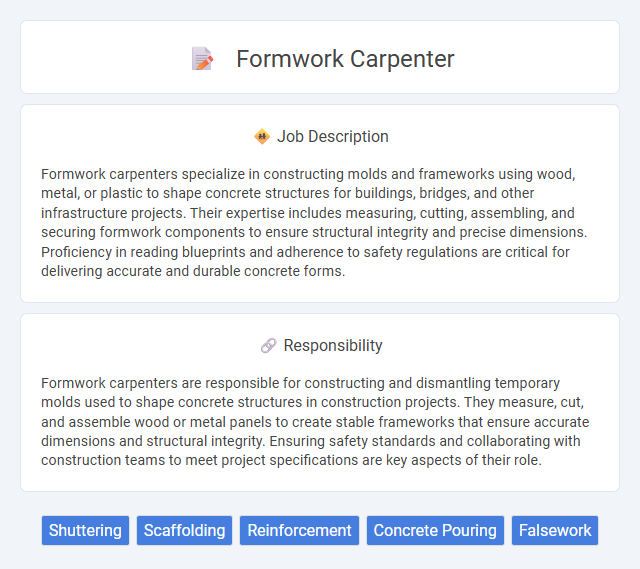
Formwork carpenters specialize in constructing molds and frameworks using wood, metal, or plastic to shape concrete structures for buildings, bridges, and other infrastructure projects. Their expertise includes measuring, cutting, assembling, and securing formwork components to ensure structural integrity and precise dimensions. Proficiency in reading blueprints and adherence to safety regulations are critical for delivering accurate and durable concrete forms.
Individuals with strong physical endurance and good hand-eye coordination are likely to find success as formwork carpenters due to the demanding nature of handling heavy materials and precise measurements. Those who prefer structured routines and working in outdoor or construction environments probably suit this job better than people seeking desk-based or less physically intensive roles. Candidates with a willingness to work in variable weather conditions and follow safety protocols may have a higher probability of thriving in this profession.
Qualification
Formwork carpenters require specialized skills in reading blueprints and constructing temporary molds for concrete structures using wood, metal, or plastic materials. Essential qualifications include proficiency in measuring, cutting, and assembling formwork components, along with knowledge of safety standards and construction codes. Certification in carpentry or construction trade programs and experience in concrete construction projects enhance job performance and employability.
Responsibility
Formwork carpenters are responsible for constructing and dismantling temporary molds used to shape concrete structures in construction projects. They measure, cut, and assemble wood or metal panels to create stable frameworks that ensure accurate dimensions and structural integrity. Ensuring safety standards and collaborating with construction teams to meet project specifications are key aspects of their role.
Benefit
A Formwork carpenter likely enjoys the benefit of steady demand due to ongoing construction projects, which may provide consistent job opportunities and income stability. The role probably offers skill development in specialized carpentry techniques, enhancing long-term career prospects. There is also a potential for higher wages as expertise grows, reflecting the technical precision required in forming concrete structures.
Challenge
Formwork carpenters face the challenge of precisely constructing temporary molds that must withstand heavy concrete loads without failing. The job likely demands strong attention to detail and problem-solving skills to ensure structural integrity and safety. Inaccuracies or material weaknesses may increase the probability of costly delays or safety hazards on construction sites.
Career Advancement
Formwork carpenters gain valuable experience in constructing molds for concrete structures, which opens opportunities for specialization in structural engineering or project management. Mastery of advanced techniques and safety standards enhances eligibility for supervisory roles and higher-paying construction management positions. Continuous skill development and certifications in construction technology significantly accelerate career growth and leadership potential within the building industry.
Key Terms
Shuttering
Formwork carpenters specialize in constructing shuttering systems essential for concrete pouring in construction projects. Skilled in measuring, cutting, and assembling timber or metal panels, they ensure precise molds that shape and support concrete structures during curing. Expertise in shuttering enhances structural integrity and accelerates project timelines.
Scaffolding
Formwork carpenters specialize in constructing temporary molds to support concrete structures, working closely with scaffolding systems to ensure safety and stability on construction sites. Expert knowledge of scaffolding assembly and disassembly is crucial, as it provides access and structural support essential for precise formwork installation. Their skills contribute directly to maintaining structural integrity and meeting project deadlines in building foundations, walls, and bridges.
Reinforcement
Formwork carpenters specialize in constructing temporary molds that shape concrete structures, ensuring precise dimensions and alignment for reinforcement placement. They skillfully install and secure steel reinforcement bars (rebar) within the formwork, maintaining correct spacing and positioning to enhance structural integrity. Expertise in reading blueprints and collaborating with engineers is essential for accurate reinforcement integration in construction projects.
Concrete Pouring
Formwork carpenters specialize in constructing and assembling temporary molds essential for shaping concrete structures during pouring. Precision in measuring, cutting, and securing wooden or metal panels ensures the concrete maintains its desired form until it hardens. Mastery of concrete pouring techniques and collaboration with concrete finishers contribute to durable and accurately shaped structural elements.
Falsework
Formwork carpenters specializing in falsework construct temporary structures that support concrete, steel, or masonry until permanent elements gain sufficient strength. Expertise in assembling and dismantling falsework is crucial to ensure safety and structural integrity during construction. Mastery of materials such as timber, steel, and engineered wood products allows precise load-bearing frameworks tailored to complex architectural designs.
 kuljobs.com
kuljobs.com